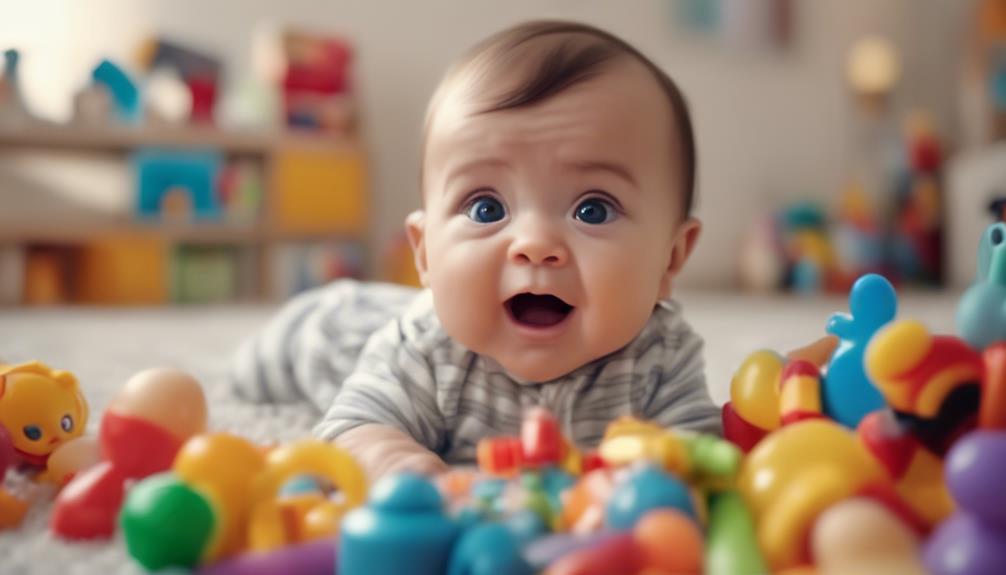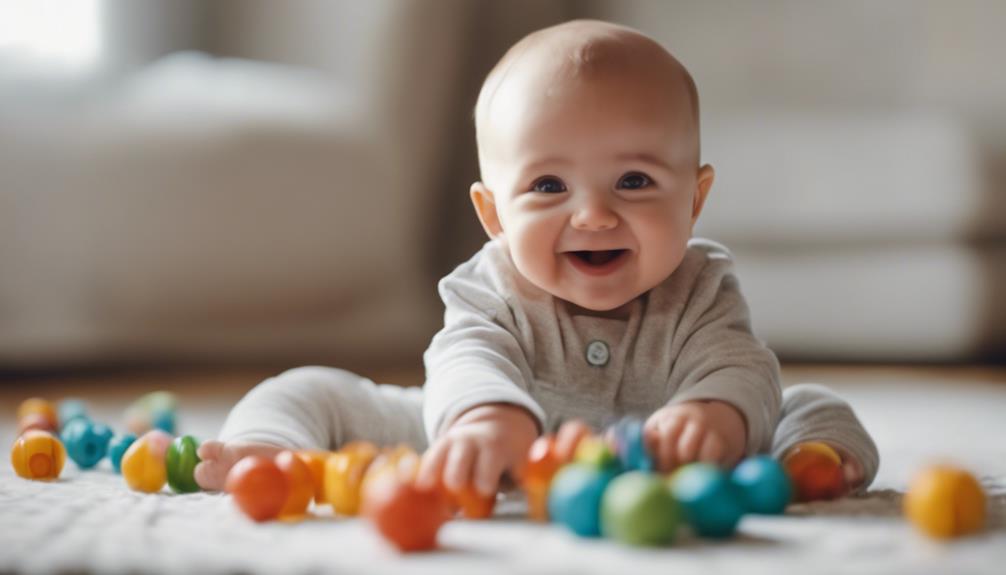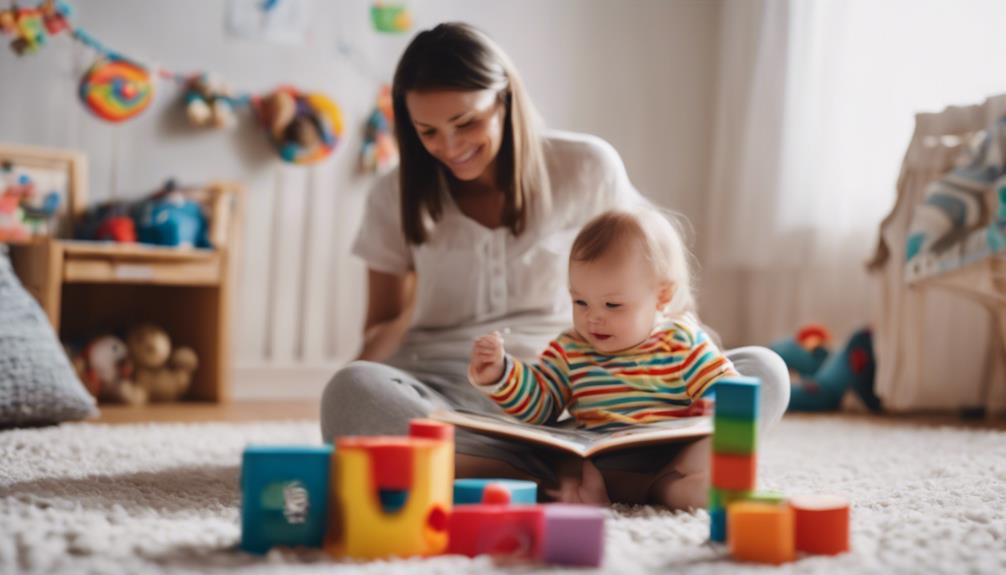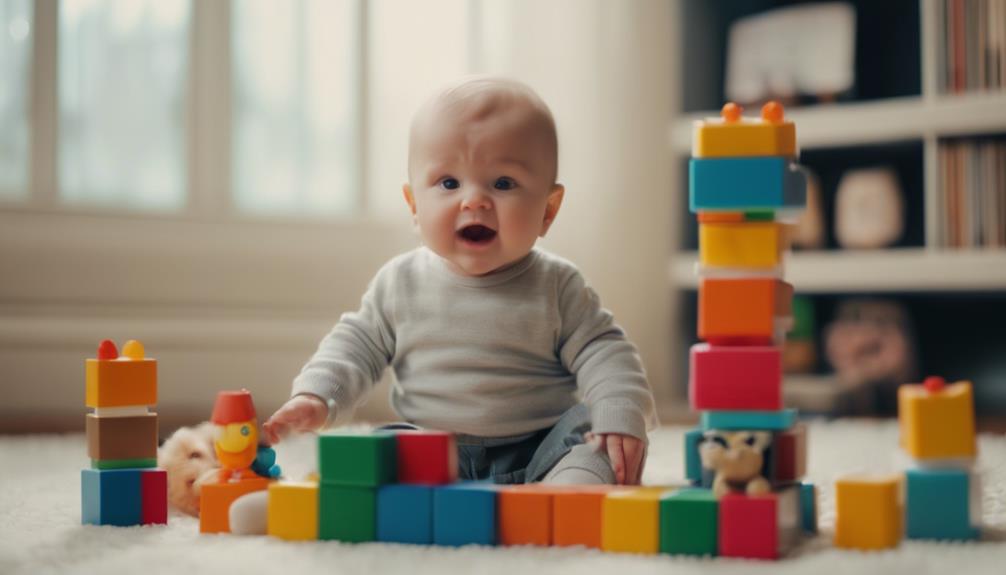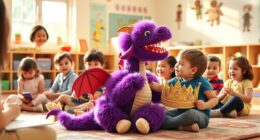At two months old, your baby is starting to become more aware of their surroundings and explore the world through their senses. They are beginning to recognize familiar voices, sounds, and even track moving objects with their eyes. By participating in repetitive activities, their cognitive abilities are developing as they establish routines and recognize patterns. Through cooing sounds and reacting to voices, they are laying the foundation for future communication skills. Encouraging interactive communication and responsive caregiving is essential for bonding, emotional security, and overall cognitive growth. These early milestones are laying the groundwork for exciting intellectual advances to come.
Key Takeaways
- Engaging with environment through senses like sight, sound, touch.
- Recognizing familiar voices and sounds, showing curiosity towards surroundings.
- Repetitive activities foster cognitive growth, enhancing alertness.
- Communication through cooing sounds, responding to voices by turning head.
- Importance of responsive caregiving for bonding, emotional security, and cognitive development.
Sensory Awareness Development
At two months old, your baby begins to develop sensory awareness, engaging with their environment through sight, sound, touch, taste, and smell. This pivotal stage allows your little one to start recognizing familiar voices and sounds, responding with curiosity and attention.
Preferences for bright colors, faces, and patterns begin to emerge, showing their growing interest in visual stimulation. These sensory experiences aren't only engaging for your baby but also play a fundamental role in their cognitive development.
By responding to various sensory inputs, your baby is actively learning about the world around them and making connections between different stimuli. This early exposure to sensory information is laying the foundation for their intellectual growth, helping them understand and interact with their surroundings in more meaningful ways.
Encouraging and facilitating sensory exploration at this stage can greatly support your baby's overall development and understanding of the environment.
Object Recognition Progress
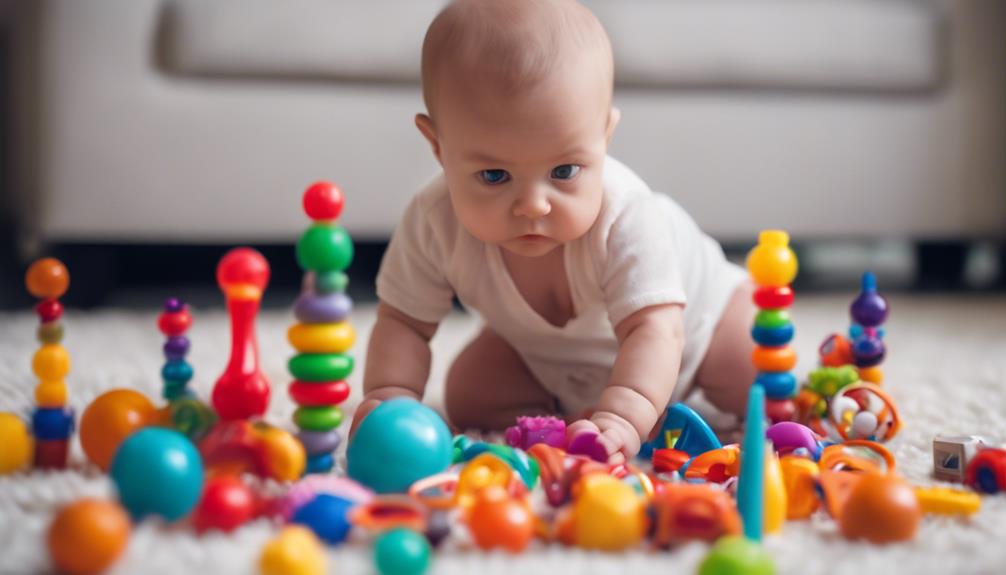
As your 2-month-old baby's cognitive abilities develop, they are progressing in recognizing familiar objects and people in their environment. The developmental milestones in object recognition at this stage are crucial for their overall intellectual growth. Your baby is starting to focus on and track moving objects, showing an increasing interest in colorful and contrasting items. The ability to distinguish between different shapes and patterns is emerging, laying the foundation for more complex cognitive processes in the future. When presented with new objects, your baby may exhibit excitement or curiosity, indicating their growing awareness of the world around them.
| Developmental Milestones | Object Recognition Progress |
|---|---|
| Focus on moving objects | Emerging |
| Interest in colorful items | Increasing |
| Distinguishing shapes | Developing |
| Reaction to new objects | Curiosity shown |
| Awareness of surroundings | Growing |
Cognitive Growth Through Repetition
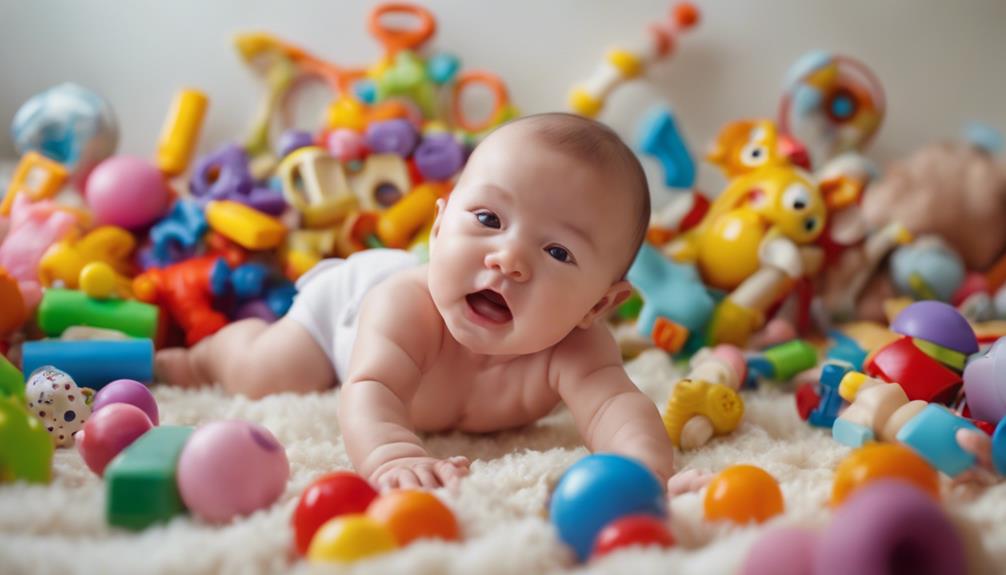
Engaging in repetitive activities is key to fostering cognitive growth in your 2-month-old baby. Through repetition, simple actions like playing peek-a-boo or making funny faces can have a significant impact on your baby's developing mind. These consistent routines and familiar activities help your baby anticipate events, build neural connections in the brain, and enhance cognitive abilities.
By engaging in repetitive play, you're providing your baby with the necessary stimuli to support their intellectual development during this critical stage. Repetition is essential as it allows your baby to recognize patterns, establish consistency, and strengthen their cognitive skills. Consistent patterns and familiar stimuli create a sense of predictability, which can aid in cognitive growth.
As you interact with your baby through repetitive actions, you're helping them form a foundation for learning and understanding the world around them. Remember, simple activities done repeatedly can have a significant impact on your baby's cognitive development.
Increasing Alertness and Focus
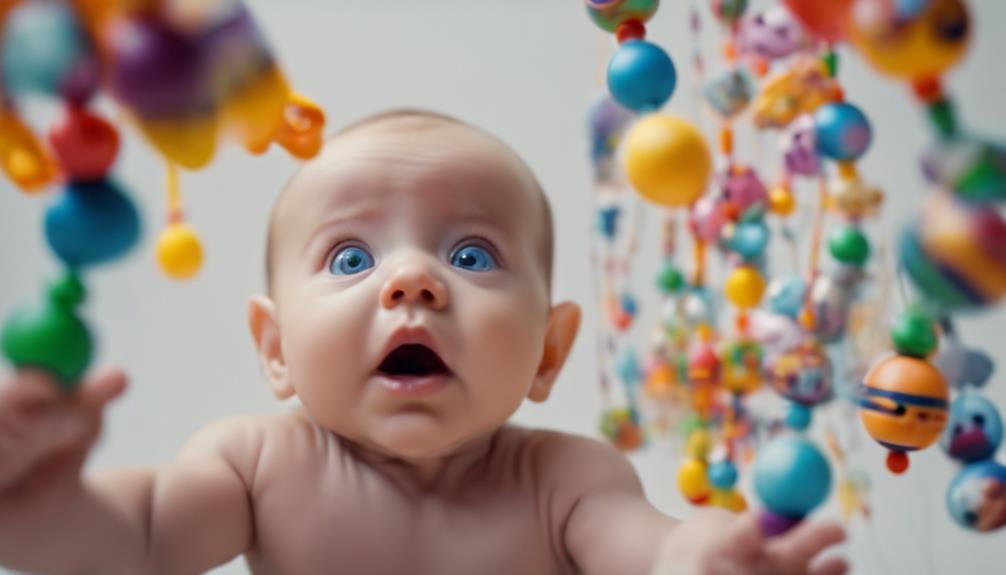
To enhance your 2-month-old baby's alertness and focus, consider incorporating stimulating activities and interactions that capture their interest and encourage exploration.
At this stage, your baby is reaching important milestones in their development. They're becoming more alert and focused, showing a growing interest in their surroundings and the people around them. You may notice them tracking moving objects with their eyes, indicating improved visual tracking abilities.
Additionally, their responsiveness to sounds and voices is increasing, demonstrating a heightened interest in engaging with the world. As your baby starts to focus on objects and people for longer periods, their attention span is expanding, laying the foundation for further cognitive growth.
Language Skills Emerging
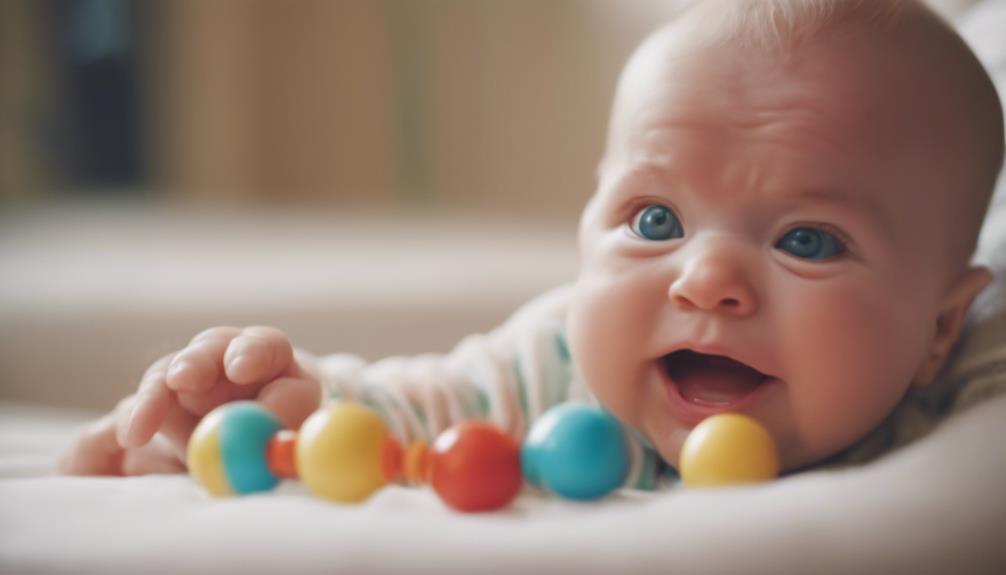
At 2 months old, your baby begins to develop foundational language skills through vocalizations and responses to sounds and voices. Here are some key points to help you understand how your baby is starting to develop language skills:
- Cooing Sounds: Your baby will start making cooing sounds as a way to communicate and express themselves.
- Response to Voices: Your baby will respond to voices by turning their head towards sounds, showing an early recognition of voices.
- Engaging in Vocalizations: Your baby will engage in vocalizations like babbling, which is an essential step in language development.
- Facial Expressions and Cries: Communication at this stage also involves facial expressions, body language, and cries to convey needs and emotions.
These early interactions with sounds and voices lay the foundation for your baby's language development, setting the stage for more advanced communication skills in the future.
Social Interaction Development

At 2 months, your baby's social interaction development is starting to bloom.
Their ability to make eye contact is important for bonding and communication.
When your baby smiles in response to you, they're showing cues of responsiveness and connection.
Eye Contact Importance
Engaging in eye contact with your 2-month-old baby is essential for fostering their social interaction development. Through eye contact, your baby begins to form connections with you and the world, laying the foundation for their social skills. Here's why eye contact is vital:
- Bonding: Eye contact helps your baby recognize you and feel secure in your presence, fostering emotional bonds and trust.
- Social Awareness: By engaging in eye contact, your baby starts to show interest in faces and expressions, a key milestone in their social development.
- Language Development: Through eye contact, babies observe mouth movements and facial expressions, aiding in understanding communication cues essential for language development.
- Emotional Connections: Encouraging eye contact through positive interactions enhances your baby's social skills, helping them build emotional connections with you and others.
Smiling Responsiveness Cues
Fostering your 2-month-old baby's social interaction development involves recognizing their smiling responsiveness cues as indicators of emotional connection and social engagement. At this age, your baby starts to smile in response to familiar faces and voices, showcasing their social responsiveness. These smiling cues demonstrate recognition and emotional bonding with caregivers, laying the foundation for future relationships.
Encouraging positive interactions and reciprocating your baby's smiles further enhances their social development. When your baby smiles back at you during interactions, it signifies their active participation in building connections and engaging with the world around them. This smiling responsiveness is a significant milestone in their emotional and social growth, showcasing their ability to connect and communicate through facial expressions.
Vocal Communication Exploration
Encouraging your 2-month-old baby to explore vocal communication through cooing sounds and responses to voices is essential for their social interaction development. Here are some essential points to keep in mind:
- Babies at this age engage in social interactions by using vocalizations, making eye contact, and turning towards sounds. These interactions help them bond with caregivers and understand the basics of communication.
- Vocal communication exploration in 2-month-olds lays the foundation for future language development. By responding to your baby's sounds and encouraging them to babble, you're supporting their linguistic skills and social interactions.
- Encouraging babbling and actively responding to your baby's attempts at communication can greatly enhance their social interaction skills. This back-and-forth interaction fosters a sense of connection and responsiveness.
- Tracking your baby's response to voices and sounds is essential in gauging their communication development progress. By observing how they react to different stimuli, you can better understand their social cues and adjust your interactions accordingly.
Anticipation of Events
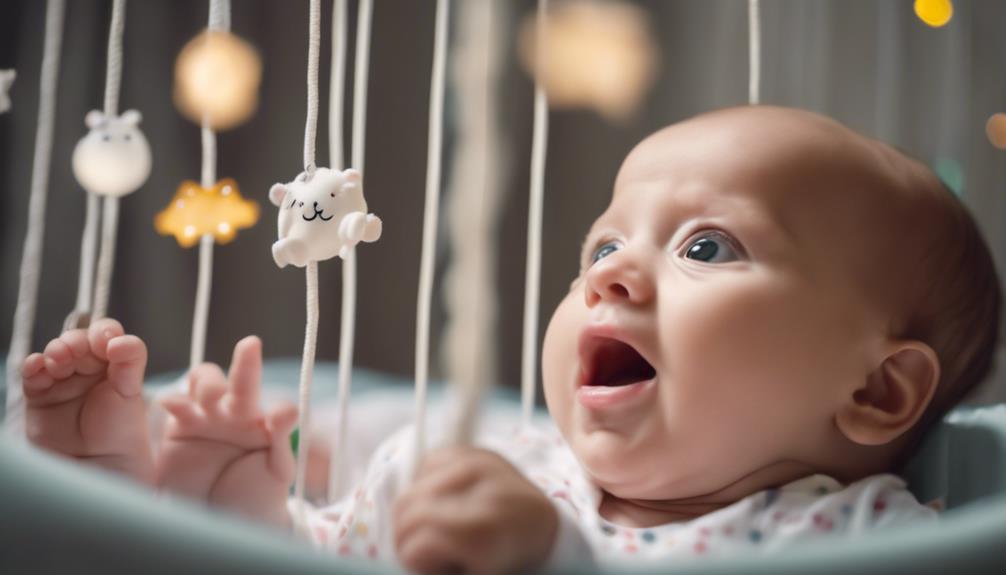
By recognizing familiar routines and actions, a 2-month-old baby begins to develop anticipation skills. This involves the ability to predict what comes next in a familiar sequence, such as mealtime or bedtime.
As a parent, you may notice signs of excitement or readiness in your baby when they anticipate a favorite activity or interaction. Anticipation of events plays a vital role in the cognitive development of your baby, helping them understand cause and effect relationships.
By experiencing predictable routines and engaging interactions, your baby's brain starts making connections between actions and outcomes. This early skill sets the foundation for more complex cognitive processes as they grow.
To support this development, maintain consistent routines and provide stimulating experiences for your baby. Your responsive caregiving will nurture their anticipation skills, fostering a sense of security and understanding in their environment.
As you interact with your baby, observe their reactions and celebrate the milestones in their intellectual growth.
Importance of Responsive Caregiving
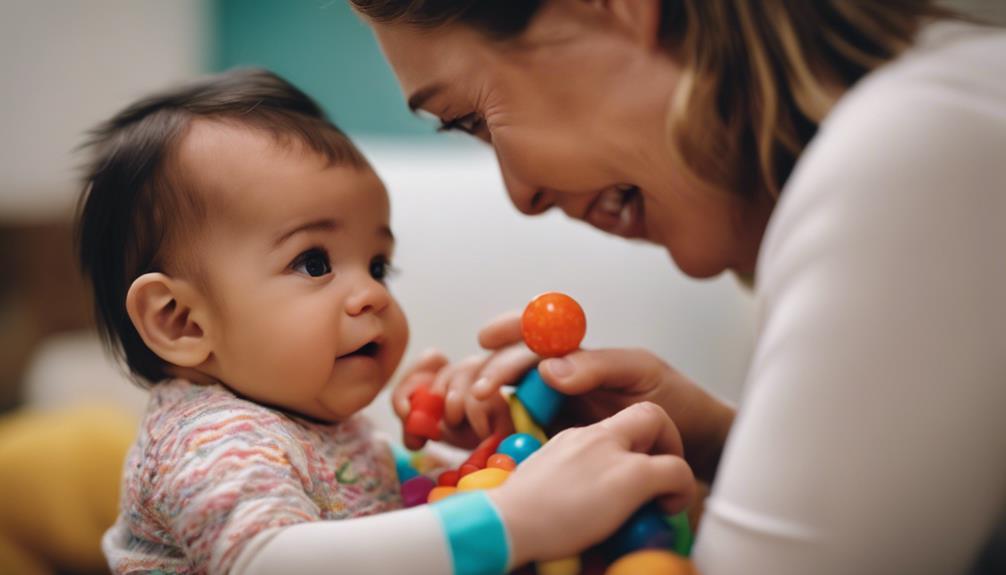
Responsive caregiving is essential at this stage as it helps you bond with your baby through interactive exchanges. By responding promptly to your baby's needs, you're building a foundation of trust early on.
This trust forms the basis for secure attachments and sets the stage for healthy emotional development in your little one.
Bonding Through Interaction
Establishing a strong bond with your 2-month-old baby is crucial for their emotional security and cognitive development through interactive caregiving. Interaction is key to nurturing this bond and promoting your baby's overall well-being.
Here are four essential ways in which bonding through interaction can benefit your baby:
- Enhanced Emotional Security: Engaging in activities like talking, singing, and cuddling helps your baby feel loved and secure, fostering a strong emotional connection.
- Improved Communication Skills: Interacting with your baby through responsive caregiving encourages the development of language and communication skills from an early age.
- Promoted Cognitive Growth: Positive responses to your baby's cues and needs create a sense of safety and well-being, which is essential for cognitive development.
- Healthy Brain Development: Eye contact, smiling, and responding to your baby's actions stimulate their brain, supporting healthy neural connections and social development.
Building Trust Early
Fostering trust early on through responsive caregiving is essential for nurturing a strong bond and supporting healthy intellectual development in babies. By promptly attending to your baby's needs and providing consistent care, you're laying the groundwork for a secure attachment that's critical for their overall well-being.
Babies rely on caregivers to meet their needs and respond to their cues, which helps them feel safe and develop trust in their environment. Through these interactions, infants begin to understand that their caregivers are dependable and caring, forming the basis for future relationships and emotional security.
Responsive caregiving not only builds trust but also plays an important role in the intellectual development milestones of babies. When caregivers are emotionally responsive, babies feel secure to explore their surroundings, leading to enhanced cognitive growth. This early trust and emotional connection create a solid foundation for babies to develop essential skills and reach their developmental milestones confidently.
Therefore, being attuned and responsive to your baby's needs sets the stage for positive social, emotional, and intellectual outcomes as they grow.
Frequently Asked Questions
How Smart Is a 2 Month Old Baby?
At 2 months old, you're developing sensory awareness and recognition skills. You track moving objects, show interest in colors and faces, and recognize familiar voices. Your brain is laying the foundation for future intelligence through simple memory and attention skills.
What Should a 2 Month Old Baby Be Doing Developmentally?
You should expect a 2-month-old baby to be tracking objects with their eyes, showing signs of visual development. They might get fussy when bored, seeking stimulation. They could self-soothe by sucking their hand and engage in tummy time for physical development.
What Are 4 Signs of Intellectual Growth in an Infant?
You'll notice signs of intellectual growth in your baby when they become more curious about their surroundings, start recognizing familiar faces and objects, show interest in cause and effect, and display longer attention spans during interactions.
What Is the Social Development of a 2 Month Old Baby?
You're starting to connect emotionally with others. Smiling, turning towards sounds, and seeking comfort through touch are signs of your social growth. Engaging with caregivers, making eye contact, and following movements are crucial for your development.
Conclusion
In summary, nurturing the intellectual development of a 2-month-old baby is essential for their growth and learning. By engaging in activities that stimulate their senses, promote object recognition, and encourage cognitive growth through repetition, you're laying a solid foundation for their future learning.
Remember, 'Rome wasn't built in a day,' so be patient and consistent in your efforts to support your baby's development. Your responsive caregiving plays a critical role in shaping their cognitive abilities and social interactions.

